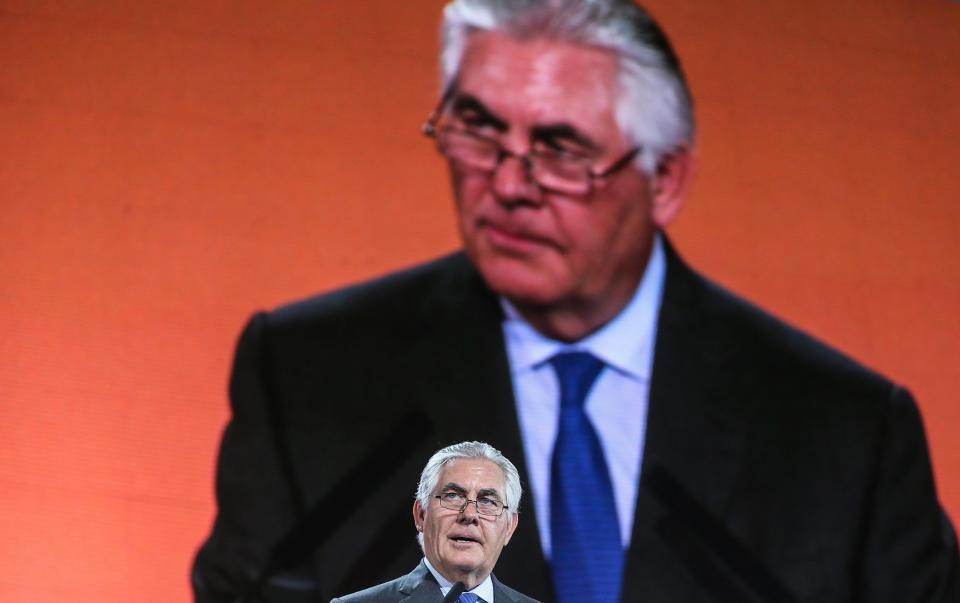Tillerson’s Exxon wants a big favor from Washington
Donald Trump wants to free the energy industry of burdensome regulations. If Exxon Mobil (XOM) CEO Rex Tillerson becomes Trump’s Secretary of State, he’ll know just where to start.
As an oil-and-gas drilling giant, Exxon may face more complex regulations around the world than nearly any other company. But one new idea has rankled the company in particular. The Securities and Exchange Commission is reportedly investigating whether Exxon and other oil companies appropriately account for climate change as a business risk that could directly affect the value of proven reserves—a key metric determining the company’s value—along with profitability. If the SEC were to pass a new rule or require new disclosures, it could wipe billions in dollars off the value of Exxon and other drillers.

All public companies are required to disclose known or anticipated business risks in their SEC filings, usually highlighting things such as unforeseen technological change, new foreign competition or an economic downturn. Exxon has mentioned climate change as a possible risk but without any detail or estimated impacts on its business.
The SEC is reportedly investigating whether to require energy companies to account specifically for climate-change risk. This could be important because new caps on the use of carbon going into effect could put finite limits on the amount of oil produced and consumed. Trump has said he’ll pull the United States out of the Paris Agreement, a breakthrough deal to cap emissions reached last year. But 194 other nations would still remain committed to the deal, and they account for a much larger portion of the world’s economy than the United States does.
If there’s a de facto worldwide limit on carbon emissions, then energy companies may never be able to tap some of the oil and gas reserves they hold all around the world. Exxon declared proven oil reserves of 8.1 billion barrels at the end of 2015, but some of that could be moot if there’s a limit on the amount of carbon that can be burned. If Exxon were to write down its reserves to exclude oil that couldn’t be realistically extracted, the company’s value and stock price would surely decline. The same goes for other big oil companies.

Exxon is unique among energy producers in that it doesn’t write down the value of reserves when prices drop. The company says its estimates are so conservative it doesn’t have to bother with write-downs. But it did indicate recently it might change that practice, given the plunge in oil prices since 2014. It now says it could write down proven reserves by as much as 20% to account for lower oil prices.
That’s different from the SEC’s examination of climate-change risks, though the effect might be similar if the agency required new risk disclosures. Exxon’s stock has sharply underperformed as the controversy over climate-change risks has intensified. Its shares are down by more than 6% since mid July, even as oil prices have been recovering. The broader market has risen 5% since then.
The State Department doesn’t oversee the SEC, so if Tillerson became the nation’s top diplomat, he wouldn’t have the authority to order the agency to drop its climate-change inquiry. But he’d obviously have direct access to the president, who appoints SEC commissioners in line with his viewpoint. And Tillerson is hardly the only energy executive advising Trump on energy. Other influential members of Trump’s kitchen cabinet include oil tycoon T. Boone Pickens and fracking pioneer Harold Hamm, who have both long pleaded for relief from government oversight.
Climate change and its effect on oil companies isn’t just a political issue, though. Some big shareholder groups and activist investors favor more disclosure on the issue by oil companies, since it could affect their ability to drill and make money no matter what the leanings of the current administration in Washington.
The attorneys general of New York and Massachusetts are suing Exxon for fraud, claiming it deceived investors for years by withholding in-house research showing a link between fossil fuels and climate change; in other words, it knew before most others that a changing climate could impede demand for its product. That suit alone could change practices at oil firms and create an incentive to disclose risks more fully. And if other sources of energy displace carbon, as some experts think is inevitable, it may be plain old economic risk that weakens demand for oil and keeps proven reserves in the ground.
Rick Newman is the author of four books, including Rebounders: How Winners Pivot from Setback to Success. Follow him on Twitter: @rickjnewman.


